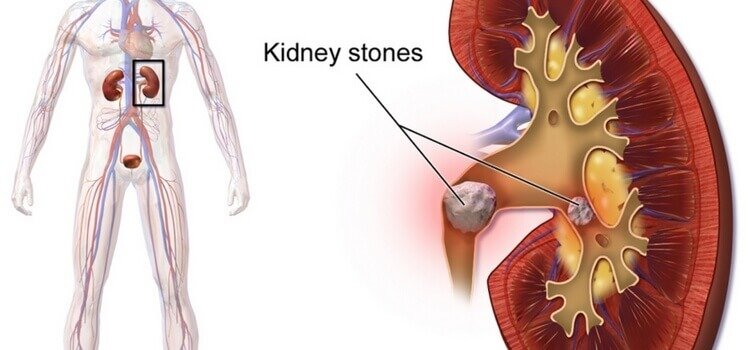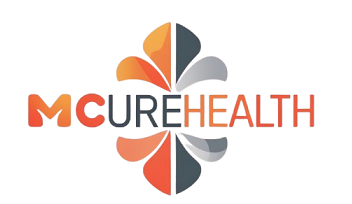
Kidney Stones Diagnosis & Treatment in Delhi
- September 13, 2019
- 15 Likes
- 732 Views
- 0 Comments
Kidney Stones Diagnosis & Treatment in Delhi
Kidney Stones Diagnosis & Treatment in Delhi
Kidney stones, also called renal calculi, urolithiasis, or nephrolithiasis, form when salts and minerals crystallize and stick together inside the kidneys. Kidney stone formation may be faster with a higher concentration of urine. The higher urine concentration causes the crystallisation of salts and minerals and the subsequent sticking together of these crystals to form kidney stones. At Mcurehealth Hospital, we provide timely diagnosis and comprehensive kidney stone treatment in Delhi, India, ensuring the highest standards of care.
Types of Kidney Stones
1. Calcium stones
These are the commonest among all types of kidney stones, composed of calcium oxalate or calcium phosphate.
2. Uric acid stone
Several conditions can lead to acidic urine. Uric acid stone formation occurs because uric acid crystals are not soluble in acidic urine.
3. Struvite stones
Infection stone is another name for struvite stones. Struvite stones comprise ammonia, a waste product, and magnesium which is a mineral.
4. Cystine stones
The occurrence of cystine stones is rare. It relates to the high concentration of cystine in the urine. The formation of these stones begins in early childhood. It is a hereditary and metabolic condition.
Causes and Risk Factors of Kidney Stones
Several causes can lead to the formation of kidney stones:
- Dehydration is a leading factor, especially in Delhi’s climate.
- High dietary intake of salt, animal protein, and oxalate-rich foods (spinach, nuts).
- Medical conditions like gout, hyperparathyroidism, metabolic syndromes, and digestive tract diseases.
- Family history and genetic predispositions.
- Sedentary lifestyle, obesity, and recurrent urinary tract infections increase risk.
- Certain medications and supplements may contribute to stone formation.
Symptoms of Kidney Stones
Smaller kidney stones can pass easily through urine, causing no symptoms. The following signs and symptoms may be present if the stones get lodged in the ureters:
- Sudden, intense pain in the flank, back, or lower abdomen (renal colic), often radiating to the groin.
- Blood in urine (pink, red, or brown discoloration).
- Painful or frequent urination.
- Nausea, vomiting, fever, chills (if infection is present).
- Urine may have a foul smell or appear cloudy.
Note: Smaller kidney stones may be asymptomatic and found incidentally during routine exams.
Kidney Stones Diagnosis in Delhi
Routine health exams or X-ray investigations may underline the presence of kidney stones causes that do not have any symptoms (silent kidney stones). The doctor may suspect a kidney stone if you are experiencing intense pain, discolouration of urine, and other symptoms.
Following are some diagnostic tests that help detect the presence of kidney stones in addition to a physical examination:
Blood Tests
To examine the presence of calcium or uric acid in the blood.
Urinalysis
The test will help detect blood in urine along with bacteria and the presence of minerals that are responsible for kidney stone formation.
Imaging tests
- Abdominal X-ray KUB and USG Abdomen are standard imaging tests.
- Advanced imaging techniques like CT scans help detect smaller kidney stones that may not show on X-ray images and Ultrasound.
Urologists at Mcurehealth Hospital specialize in comprehensive kidney stones diagnosis and care.
Kidney Stones Treatment in Delhi
Your doctor chooses an appropriate kidney stone treatment option by considering the size of the stone, severity of symptoms, and presence of infections.
Waiting for the Natural Passage of the Kidney Stones
Smaller stones (<5mm) that cause no infection and severe symptoms can pass through urine depending upon the patient’s condition. Patients should come for regular follow up with a kidney stone while on conservative kidney stone treatment as even small stones may require active intervention sometimes.
Medical Therapy of Kidney Stones
Besides antibiotics to treat infections that may occur because of kidney stones, Doctors may recommend medication therapy to improve the chances of stone removal. Some medicines from the alpha-blocker category relax the ureters and enable the stone to pass out spontaneously in some cases.
Active Intervention:
- Shock Wave Lithotripsy (ESWL): Removal of stones may require breaking the stones into smaller pieces that can easily pass in the urine. The ESWL disintegrates the large stones.
- Percutaneous Nephrolithotomy (PCNL) – Surgical removal of significantly large stones is possible by using Percutaneous.
- Retrograde Intrarenal surgery (RIRS) – Retrograde Intrarenal surgery is another minimally invasive technique for kidney stones.
- Ureteroscopy (URS): Endoscopic removal or fragmentation of stones from the middle and lower ureter.
- Open Surgery: Reserved for rare, complicated cases where minimally invasive methods are unsuitable.
Treatment plans are personalized based on stone size, type, location, patient’s health, and symptoms.
Post-Treatment Care and Lifestyle Recommendations
- Stay well hydrated: Drink 2.5 to 3 liters of water daily.
- Follow dietary guidelines: Limit salt, animal protein, and oxalate-rich foods; include citraterich fruits (lemon, orange).
- Maintain healthy weight through a balanced diet and exercise.
- Regular medical follow-ups with urine and imaging tests to prevent recurrence.
- Follow doctor’s medication and care instructions meticulously post-procedure.
Risk Factors and Prevention Tips for Kidney Stones
- Adequate hydration to dilute urine.
- Balanced diet low in excess salt, sugar, and animal protein.
- Avoid excessive vitamin C or calcium supplements without medical guidance.
- Manage underlying health conditions such as diabetes, gout, and hyperparathyroidism.
- Regular exercise and lifestyle modifications.
Why Choose Mcurehealth Hospital for Kidney Stone Treatment in Delhi?
- State-of-the-art diagnostic facilities including advanced CT and ultrasound imaging.
- Comprehensive treatment options from conservative to the latest minimally invasive surgeries.
- Experienced urologists and nephrologists with specialized training in kidney stone management.
- Commitment to patient-centric care ensuring personalized treatment and follow-up.
- Access to multidisciplinary experts for related metabolic and kidney conditions.
- Convenient appointment booking and emergency services.
Frequently Asked Questions (FAQs)
1. What are the common symptoms of kidney stones?
Severe flank pain, blood in urine, painful urination, nausea, and urinary frequency.
2. How are kidney stones diagnosed in Delhi?
Through blood and urine tests, ultrasound, X-rays, and CT scans.
3. What treatment options are available for kidney stones?
Treatment ranges from natural passage and medications to lithotripsy and minimally invasive surgeries based on stone characteristics.
4. When is surgery necessary for kidney stones?
Large stones (>6-7mm), persistent pain, infection, obstruction, or failure to pass stones naturally warrant surgical intervention.
5. Can kidney stones be prevented?
Yes, with proper hydration, dietary management, lifestyle changes, and medical followup.
6. How long does recovery take after kidney stone surgery?
Most minimally invasive procedures have a recovery time of a few days to two weeks, depending on the procedure and patient condition.
7. Is kidney stone treatment expensive in India?
Costs vary by treatment type and hospital; Mcurehelath Hospital offers transparent cost estimates and assistance with insurance.
8. Can kidney stones recur after treatment?
Yes, recurrence is common; preventive care and lifestyle modifications are crucial.
The Pillars of Nutrition for Wellness
Mitral Valve Replacement Surgery in Delhi
Leg Swelling and Discolouration? Recognising Vascular Disorders in Time



Leave Your Comment